- Home
- Henry James
Travels With Henry James Page 18
Travels With Henry James Read online
Page 18
LONDON IN THE DEAD SEASON
September 7, 1878
The great disaster on the Thames, ca. 1878.
THERE ARE MOMENTS WHEN IT SEEMS TO SAVOR OF affectation to talk of London at any time as “empty”—to declare, in the language of the locality, that there is not a creature in town. But everything is relative, and it is not to be denied that at this time of the year the noisiest city in the world is apt to become peculiarly quiet. Bond Street is tranquil and Piccadilly is soundless; the knocker is dumb in genteel neighborhoods, the little double-tap of the postman even becomes unfamiliar, and the ear is conscious only of the creaking boots of the lonely policeman as he slowly marches through a vista of darkened windows. I don’t know how the policeman likes his solitude and his leisure; but there is something about London in its interlunar swoon, as Shelley says, which an occasional survivor of the fashionable period finds decidedly agreeable. It may be that as an adoptive rather than a native cockney I exaggerate its charms at the present moment, according to the rule that converts are always apt to be fanatics. If you like London for itself, as the phrase is, you get more of London itself at this time than at any other. You enjoy a kind of monopoly of certain parts of it, and you appreciate some of those great features which, at any time from January to July, are thrown into the background by the crowd and the bustle. I will not attempt to enumerate the features in question, or suffer myself to be beguiled into an attempt to demonstrate that among the gentle influences of September the British metropolis takes on an unsuspected loveliness. One’s enjoyment here at such a time must after all be mainly, as the metaphysicians say, subjective. It comes from the sense of boundless leisure—of the absence of interruptions. This operates as a kindly revelation of the crowded quality of existence during the lively portion of the year. For a person leading, in however small a degree, what is called a “London life,” a fair, smooth, open stretch of time—without visits or notes or social obligations—becomes the ideal of felicity.
If this ideal is realized at present, there are of course losses in the matter as well as gains. The London clubs, in the early autumn, betake themselves to house-cleaning; the familiar portal of your favorite resort is shut in your face, with the imperfect compensation of an announcement that for the next few weeks you are at liberty to make use of another establishment. At the other establishment you feel a good deal like an intruder: you are unfamiliar with the customs of the place—you imagine that the servants and members glower at you, as you go and come—you feel that there is a want of confidence in your deportment, that you are not welcomed, but only tolerated. In so far, however, as a club is a place for reading the papers, that at the present time is soon done; and if a gentleman should happen to want the copy of the Times which you have in hand you will not deprive him of it for many minutes. The morning journals are distinctly dull: in the absence of stirring intelligence the smallest contributions are thankfully received. That ingenious species of composition and product of our time, known as the “social article,” receives particular attention; it is usually of a jocular cast and—once a text, or a pretext, is secured—is remarkable for the facility of its transitions. That characteristic of English manners which is supposed by strangers to be the leading one—the passion for “writing to the Times”—is at present a great godsend to that journal. I am ignorant whether the Times receives during the months of August and September a greater number of confidential epistles from the injured or the gratified, the disappointed, the swindled, the inquisitive, or the communicative Briton, but it certainly prints a great many more. One class of communications comes to it, of course, in especial abundance—the complaints of English travellers who are taking a holiday upon the Continent. There is a daily outpouring of grievances into the maternal bosom of the great newspaper; and I think there are few spectacles more striking and suggestive to a stranger. A stranger makes all kinds of reflections upon it, but he ends on the whole, decidedly, with admiring it. It is ridiculous, in many ways—sordid, egotistical, obtrusive; but it throws an interesting light upon that feature of the English character which is so intimately connected with the greatness of England—the stubborn sense of the rights of the individual. The English individual has not only a stronger, but a much more definite, conception of his rights than any other; he has a more definite and more cultivated notion of justice. It is this definiteness that is the striking point. Theoretically, an American has quite as lively a sense of his dues; but practically, politics apart, his notion of what these dues consist of is exceedingly vague and amateurish. An Englishman never hesitates; he has them at his fingers’ ends. The magnitude of the infraction matters little; his comfort is as sensitive as his honor; the principle is sacred that the other part of the bargain—the part complementary to his own (which he has discharged by paying a certain sum of money or taking a certain course)—shall be performed rigidly and to the letter. No American who has known many Englishmen can have failed to be struck with the trouble his friends have often been willing to take for the redress of grievances which have seemed to him trifling and not worth time and temper; and many Englishmen, on the other hand, who have been acquainted with Americans, must often have been amazed at the good humor of the latter—the blank serenity, akin to the Mussulman’s assent to fate—under imposition, delay, incivility. What is meant by “English comfort” is at bottom but this fixed standard of punctuality and of deference to the expectations of the consumer; and it is very certain that life is very comfortable—for consumers, of course—in a country where no offence against this standard is accounted venial.
I should give a very false impression of the current hour in London if I failed to say that for the last three days the newspapers have contained something very different from the usual complaints of leaking lamps in railway carriages and of the heavy boots worn at night in the corridors of Swiss hotels. A very terrible accident occurred on the 3d ult. on the Thames—an accident which has added a peculiar gloom to the actual soberness of London. A small, overcrowded steamer, returning from an excursion to Gravesend, was run down by a big collier and sunk in an instant, with seven hundred persons on board. This huge calamity will, of course, long since have been made known in America, and you will have been spared those horrible details in which the voluminous reports published here abound. The collision took place just above Woolwich, and the latest computation appears to be that six hundred persons have perished. I have, at various idle moments, found entertainment in a sixpenny steamer, and may almost claim familiarity with that dusky stretch of the Thames which lies between Woolwich and London. The adoptive cockney, of whom I spoke just now, feels a curiosity to sound the depths of metropolitan amusement, and he has been known, under the guidance of this feeling, to push his researches even as far as Gravesend—a very shabby resort of pleasure, now for some time to be associated with the hideous disaster of three days since. The Thames scenery between London and Gravesend is anything but beautiful, but it has always seemed to me to have a certain sordid picturesqueness. There was entertainment to the eye in the dusky, irregular waterside, which seemed to stand begging to be “etched,” and in the large, turbid, crowded river, with the slow-moving vessels almost fixed in it, as if it were liquid glue. The place seemed dingy and dreary, but it never seemed tragical—any more than the participants in a Gravesend excursion looked like actors in a tragedy.
I can speak of such an assemblage from observation, for on a certain hot Sunday, some time ago, I found myself in the midst of one. Partly as an enquiring stranger and partly as the victim of a misconception of the attractions of Gravesend I went to the latter place by train, to take the air. After taking as much of it as seemed agreeable, I returned to London with a very big crowd on a very small boat—the same rotten little steamer, possibly, which collapsed at a touch the other night. In so far as my expedition served as a study of the manners of the British populace it was highly successful, and the objects of that study have remained vividly imprinted on my mem
ory. Gravesend itself can best be described by an expression borrowed from the feminine vocabulary: it is simply too dreadful. It is an extremely dirty and most ingeniously vulgar little place, close upon the river, whose bank is adorned with a row of small establishments, half cottage and half shop, devoted to traffic in shrimps and tea. The doors of these little tea-houses are garnished with terrible maidens—very stout and robust, high-colored and loud-voiced—who dart forth at the wayfarer, tea-pot in hand, and, vociferating in his ears certain local formulas, almost hustle him into their unappetizing bowers. Behind the town is a place of entertainment known as the Rosherville Gardens, where there are more conveniences of the kind I have described, together with a hundred others in the way of rock-work and plaster statues and convivial grottoes. The British populace, returning from what the advertisements call a “happy day” at Rosherville, struck me, on the steamer, rather less favorably than an adoptive cockney could have wished. I had nothing to do for a couple of hours but to sit upon the paddle-box and watch it; but there was no great charm in the spectacle. The “people” in certain foreign countries, notably in France and Italy, is a decidedly more remunerative spectacle than the moneyed class. It strikes one as containing more than half the vivacity and originality of the nation. But this is far from being the case here. There is something particularly coarse and dusky about an English mob, something which is not redeemed even by its great good-nature, and which comes, I think, in a great measure from the absence of the look of taste and thrift in the women. I don’t know, however, that this reflection is at all pertinent to the horrible disaster which occurred last Tuesday, and which has made, for the week, a kind of charnel-house of all the Woolwich shore. With all its imperfections on its head, a very considerable group of the London populace was cruelly submerged. There will be an enquiry and a good deal of sensational reporting, and then the whole episode will sink beneath the surface as the boatload of excursionists sank. Meanwhile the grouse-shooting and the destruction of pheasants and partridges will proceed apace. A very large number of Englishmen are just now engaged in this pastime, and in the great stillness of London you can almost hear the crack of the fowling-pieces on the northern moors. A great many legislators are within earshot of this delightful sound; a few others are listening to the even sweeter music of their own voices. The Times has a regular corner devoted to Parliament out of session, which has lately contained several long speeches from honorable members to their constituents. But for the moment the public mind—or, at any rate, the private mind—is not political.
IN SCOTLAND
September 1878
Princes Street and castle from Scott’s Monument, Edinburgh, ca. 1890.
I. SEPTEMBER 25, 1878
Now that the metropolis is so inanimate I hardly need apologize to you for writing from a livelier place than London. It is not making an exorbitant claim for Edinburgh to say that at present it deserves this description, for it has simply gained by the departed life of its sister capital. This afternoon, with a military band playing in the long green garden below Princes Street, in the shadow of the magnificent mass of the Castle Rock, with a host of well-dressed people collected to listen to the music; with the brilliant terrace above adorned with prosperous hotels and besprinkled with tourists divided between the attractions of shop-fronts and the striking picture formed by the Old Town and its high-perched citadel—this admirable Edinburgh looked like a very merry place. Scotland is a highly convenient playground for English idlers, and Edinburgh, during the early autumn, comes in for a great deal of the bustle produced by the ebb of the southern tide. For the last six weeks this annual current has been irrigating (not to say irritating) the Scottish moors and mountains; and it is hardly too much to say that at this period you must come to Scotland to see what England is about.
When I came hither myself, a little more than a fortnight ago, there were still plenty of members of the large class which has autumnal leisure to spare, hurrying northward. The railway-carriages were occupied, and the platforms of the stations ornamented, by ladies and gentlemen in shooting-jackets of every pattern and hue. I say “ladies” advisedly, for the fairer members of these groups had every appearance of being sporting characters. I do not know what may be the feminine costume of this particular period in America, but here it consists of a billycock hat with a very small brim, a standing collar of a striped or figured linen, like that belonging to a “fancy” shirt, a scarf in a sailor’s knot, a coachman’s overcoat, made of some cross-barred material like the nether integuments of a “nigger-minstrel,” and a petticoat clinging as closely as a pair of tight trousers and effectually completing the illusion. The proper accessories of such a figure are a gentleman draped rather more redundantly, and an aggregation of luggage consisting of a good many baskets and bath-tubs, of several fasces of fishing-rods, and divers gun-cases that look like carpet-bags flattened and elongated by steam-pressure; the whole set off by a couple of delightful setters or retrievers fastened to the handle of a trunk, and, amid the bustle of the railway-platform, turning themselves about and sniffing at this and that in touching bewilderment. A friend of mine, an American, was once asked to mention the two features of English life which had made most impression on him. He hesitated a moment, and then he said, “The dogs and the children.” The children apart, it is worth coming to Scotland simply to encounter the very flower of the canine race—the beautiful silken-eared animals that follow in the train of the happy Englishmen who have hired a moor at a thousand pounds for six weeks’ grouse-shooting. England is certainly the paradise of dogs; nowhere are they better appreciated and understood. But Scotland is their seventh heaven. Of course all the Englishmen who cross the Tweed have not paid a thousand pounds down as the basis of their entertainment, though the number of gentlemen who have permitted themselves this fancy appears to be astonishing. Tourists of the more vulgar pattern, who have simply come to enjoy the beauties of nature and to read the quotations, in the guide-books, from Sir Walter Scott, are extremely numerous, and Scotland, as regards some of the provisions that she makes for them, takes on the air of a humbler Switzerland. One must admit, however, that though the Scotch inns are much better than the English, they do not push their easy triumph very far; they bear the same relation to the Swiss hotels that the scenery of the Highlands does to that of the Alps. But if their merits are not unalloyed, it is not for want of resolution—as, for instance, in the matter of the table d’hôte. The table d’hôte in the British Islands is essentially an importation, an exotic, a drooping and insalubrious flame. But like all new converts the Scotch innkeepers are immoderate; they are of the opinion that of a good thing there can never be too much. A couple of days since, at Stirling, I was invited to be present at a table d’hôte at half-past eight a.m. The idea was sufficient to make the bodies of Meurice and Francatelli turn over in their graves. I am bound to admit, however, that I countenanced this matutinal heresy by my presence; and I again had occasion to reflect upon the extreme punctuality with which, in the British organism, the desire for copious supplies of animal food asserts itself. A week ago, at a table d’hôte at Ballater, just after the company had seated itself, there came a great thump at the head of the table—a rap which caused me to start with the apprehension that I had inadvertently introduced myself into a spiritualistic séance. I was speedily reassured—a gentleman growled out a “grace.” Nothing, in effect, could have been less spiritual than this performance; but I wondered what, even from a material point of view, the shades of Francatelli and Meurice thought of it.

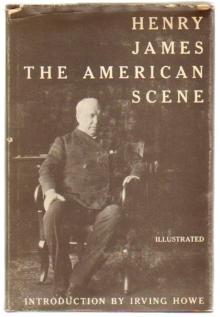 The American
The American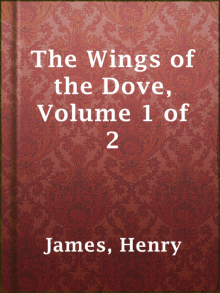 The Wings of the Dove, Volume 1 of 2
The Wings of the Dove, Volume 1 of 2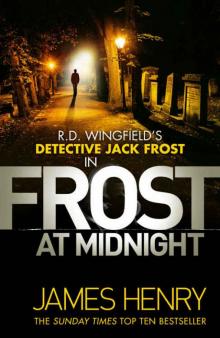 Frost at Midnight
Frost at Midnight Morning Frost
Morning Frost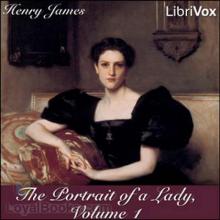 The Portrait of a Lady — Volume 1
The Portrait of a Lady — Volume 1 Fatal Frost
Fatal Frost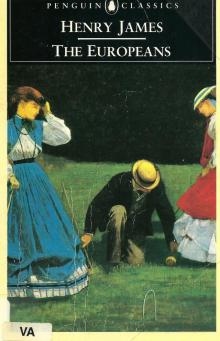 The Europeans
The Europeans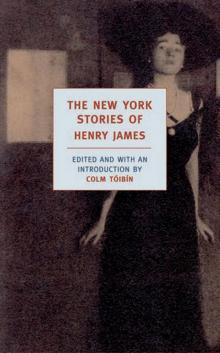 The New York Stories of Henry James
The New York Stories of Henry James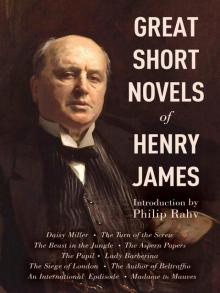 Great Short Novels of Henry James
Great Short Novels of Henry James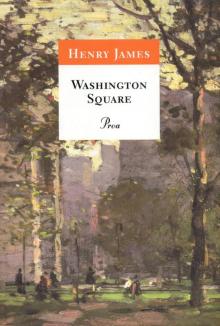 Washington Square
Washington Square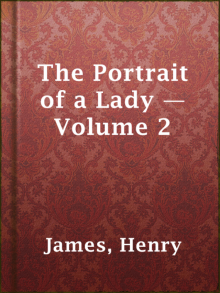 The Portrait of a Lady — Volume 2
The Portrait of a Lady — Volume 2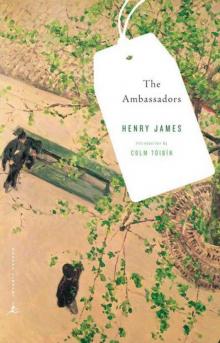 The Ambassadors
The Ambassadors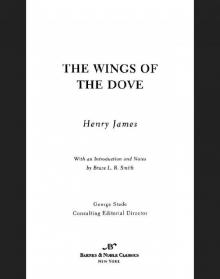 The Wings of the Dove
The Wings of the Dove The Princess Casamassima (Classics)
The Princess Casamassima (Classics)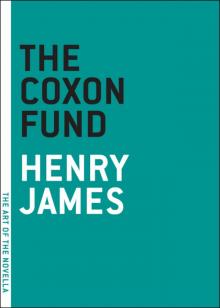 The Coxon Fund
The Coxon Fund First Frost
First Frost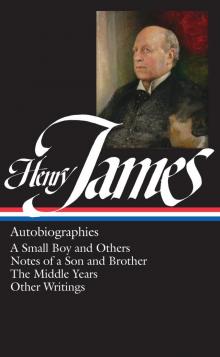 Henry James
Henry James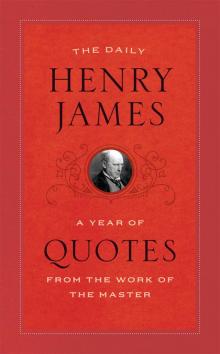 The Daily Henry James
The Daily Henry James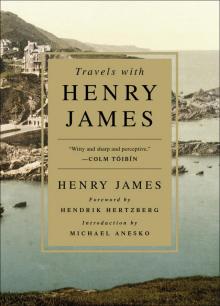 Travels With Henry James
Travels With Henry James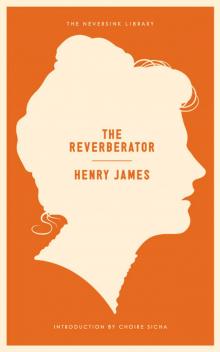 The Reverberator: A Novel
The Reverberator: A Novel What Maisie Knew (Henry James Collection)
What Maisie Knew (Henry James Collection)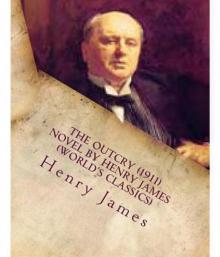 The Outcry
The Outcry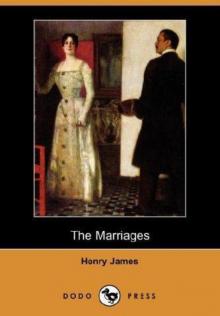 The Marriages
The Marriages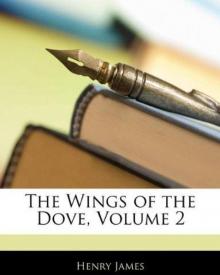 The Wings of the Dove, Volume 2
The Wings of the Dove, Volume 2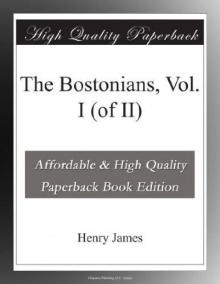 The Bostonians, Vol. I
The Bostonians, Vol. I The Outcry: -1911
The Outcry: -1911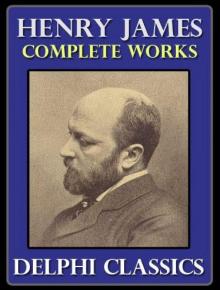 The Complete Works of Henry James
The Complete Works of Henry James Letters from the Palazzo Barbaro
Letters from the Palazzo Barbaro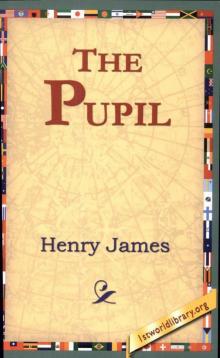 The Pupil
The Pupil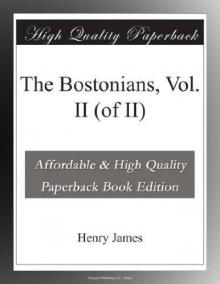 The Bostonians, Vol. II
The Bostonians, Vol. II Pandora
Pandora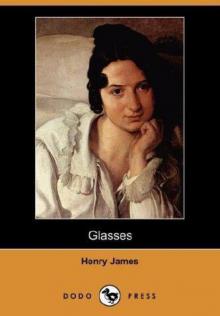 Glasses
Glasses The Princess Casamassima
The Princess Casamassima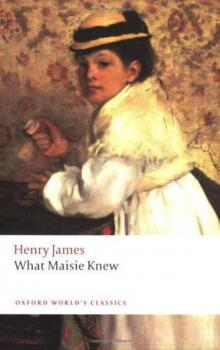 What Maisie Knew
What Maisie Knew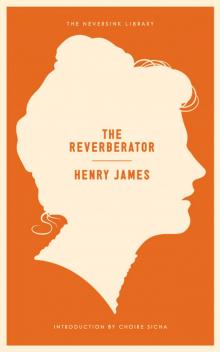 The Reverberator
The Reverberator The Golden Bowl - Complete
The Golden Bowl - Complete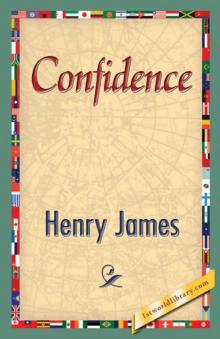 Confidence
Confidence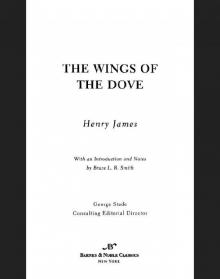 Wings of the Dove (Barnes & Noble Classics Series)
Wings of the Dove (Barnes & Noble Classics Series) The Spoils of Poynton
The Spoils of Poynton